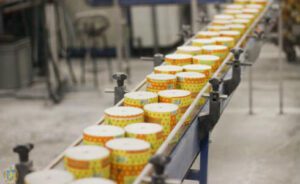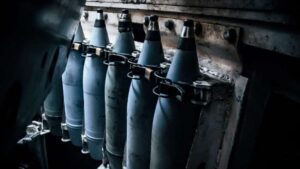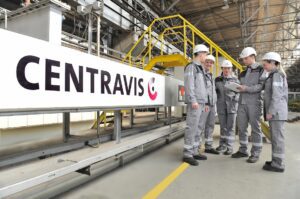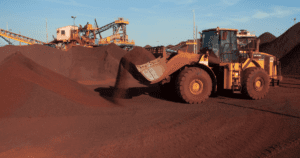
In January-October 2022, the Kokhavyn Paper Factory (KPF, Lviv Oblast), which produces hygienic paper products (TM Kokhavinka), produced UAH 783.68 million worth of products – 43.9% more than in the same period of 2021.
According to statistical data of UkrPapir Association, provided to Interfax-Ukraine news agency, thus the mill has slightly increased the growth rate of this indicator compared to the same period last year – for nine months it was 40.8%.
In physical terms, the production of base paper for sanitary products increased by 4% – to 33.8 thousand tons. Production of toilet paper rolls went up by 17.2% up to 108.7 million pieces, which is the second largest after the Kiev KBC (273.2 million pieces).
During this period, the primary enterprises of the industry produced more than 476.5 million paper rolls (-17.4% on January-October 2021).
KBF, which has been operating since 1939, produces base paper for sanitary goods, as well as toilet paper and paper towels. The capacity of the paper machines is 19 thousand tons per year, the processing equipment is 90 million rolls per year.
The factory has practically not stopped production since the beginning of this year.
KBF in 2021, according to UkrPapir, increased production by 13% to 673.7 million hryvnias by 2020.

In recent months, the state concern Ukroboronprom has established the production of ammunition of “Soviet” caliber 122 and 152 millimeters, as well as mines of caliber 120 millimeters.
“Means of destruction have been successfully tested and are produced according to NATO technology. It is not the first month. It is dispersed at various facilities, including partner countries,” the concern said in a press release on Friday.
“Ukroboronprom stresses that the ammunition it produces should reduce the dependence of Ukrainian artillery on supplies from abroad, where stocks of Soviet caliber shells and mines are gradually running out.
The concern also reported that it is continuing its reform to transform Ukroboronprom into a modern high-tech defense company. As of today, more than two dozen state defense enterprises have been transformed into business companies, with the concern itself next in line, the release said.
“The reform will increase the transparency of the state defense sector, attract even more investment, transfer technology, create more joint ventures, including with NATO countries, and help secure the defense industry from corruption risks,” Ukroboronprom said.
It said it will jointly produce and develop heavy weapons and military equipment with companies from at least six NATO member states: Poland, the Czech Republic, France, Denmark and several more, the agreements with which do not provide for the disclosure of any data.
“We create joint defense enterprises, build closed-cycle ammunition production lines, jointly produce armored vehicles and multiple-launch rocket systems and develop new high-tech weapons. To do this, we use both existing facilities and newly created ones in safe locations,” Ukroboronprom stressed.
The concern added that in order to accelerate the development of existing international defense projects and the emergence of new ones, it agreed on further coordination with the Ukrainian Ministry of Foreign Affairs.

Centravis Production Ukraine PJSC (Centravis Production Ukraine), part of Centravis Ltd. holding, is provided with electricity in the necessary quantity and works in three shifts.
Artem Atanasov, chief sales officer (CSO), said in a letter to customers Friday that Ukraine continues to be in an active defense against the aggressor country.
“But the situation on the front is changing dynamically. Our Armed Forces are moving closer to Kherson and the Russian military command has announced the withdrawal of troops from the right bank of the Dnieper River. Nevertheless, Ukrainians perceive everything with restraint and this is how it should be in wartime,” states the Sales Director.
According to him, “Centravis” production continues to work effectively, the plant receives electricity without interruption. Key sectors of hot and cold shops continue to work in 3 shifts. All equipment is up and running and production is stocked with all necessary materials.
“Our logistics team is constantly looking for the best and safest ways to deliver finished products. Our sales offices around the world in Essen, Milan, Krakow, Lugano, Houston and Dubai are open,” Atanasov noted.
And he added that Centravis is optimistic about the future.
“After ADIPEC in Abu Dhabi, we got new partnerships and we see a high interest of the world’s leading companies in our products. This allows us to plan to expand our production in the near future,” summarized the top manager.
“Centravis” is one of the world’s largest manufacturers of seamless stainless steel pipes, founded in 2000. Its production capacities are located in Nikopol (Dnepropetrovsk region). It ranks among the top 10 world players and supplies pipes to over 70 countries from different regions of the world, in particular to Thyssenkrupp, Buhlmann, BMW, Alstom, Linde, Samsung, and Volkswagen.
Before the Russian aggression the company employed over 1400 people.
Holding Centravis Ltd. was created on the basis of Nikopol Stainless Pipes Plant CJSC, service and trading companies of Industrial and Commercial Enterprise Yuvis Ltd. Its shareholders are members of the Atanasov family.
Centravis Ltd. owns 100% of shares of Centravis Production Ukraine PJSC.

Production of beer in Ukraine (except non-alcoholic with alcohol content up to 0.5% vol.) in January-October 2022 decreased by 28.6% compared to the same period of 2021 – to 103.8 million dal, according to the website of the brewers’ organization Ukrpivo.
It is noted that the industry is gradually recovering after the fall of production of this drink in the first quarter by 50% due to the Russian invasion and the shutdown of some of the breweries of the country. Thus, in the first four months of this year the decline was 42.8% over the same period of last year, in January-May – 36.4%, in January-June – 32%, in January-July and January-August – 31.6%, and in January-September – 30.5%.
According to Ukrpiva, there is also a recovery in the production of malt. In particular, after the fall in the first quarter of 2022 by 40.8% and a sharp decline in June by 50.6%, in January-October the rate of production decreased to 17.7% compared to the same period in 2021 – 146.5 thousand tons of malt was produced.
As reported, Ukraine in 2021 produced 5% less beer compared to 2020 – 170.5 million dal, and in 2020, its production decreased by 0.4% compared to 2019 – 179.7 million dal.
Malt production in 2021 was 218,500 tons, down 19.5% from a year earlier. At the same time, its production in 2020 decreased by 18% compared to 2019, to 275 thousand tons.

Krivoy Rog iron-ore combine (KZHRK) in January-October of this year reduced the production of marketable iron ore underground mining by 26.8% compared to the same period last year – up to 2.654 million tons.
According to the company, in October, mines “Pokrovskaya”, “Krivoy Rog”, “Kozatskaya” produced 40 thousand tons each, “Ternovskaya” – 30 thousand tons.
The total output of the Company last month amounted to 150 thous. tons, while in September it was 200 thous. tons, in August – 270 thous. tons, in July – 280 thous. tons.
As reported, KZHRK in 2021 increased the production of iron ore from underground mining by 12.7% compared to 2020 – up to 4.298 million tons.
KZHRK specializes in underground mining of iron ore. KZHRK has four mines: “Pokrovska” (formerly “October”), mine “Krivorizka” (“Rodina”), “Kozatska” (formerly “Gvardeyskaya”) and “Ternovskaya” (formerly the Ordzhonikidze mine, then named after Lenin).
Starmill Limited owns 99.88% of the company.
KZHRK is owned by Metinvest Group and Privat Group. The company’s operational management is carried out by Privat Group.

Yuzhny Mining and Processing Integrated Works (YuGOC, Dnipropetrovsk Region) will resume production on November 7 after a slowdown since July 1 this year.
According to the official information of the plant, the operational business plan for the current month will be 173 thousand tons of iron ore concentrate. Commodity products will be sent to steelmakers Kametstal and Zaporizhstal.
At the same time, it is specified that the planned production volume is distributed between the two ore-dressing plants (ROF) of the plant, which will work around the clock. A total of four processing sections will start operating.
The production process also begins in the open pit of Yugokhta, where 398 thousand tons of yellow ore will be extracted and sent for processing. Transportation of raw materials will be performed by railway transport.
Production also starts with a reduced load in the department of railway transport, crushing and transporting complex, slurry systems shop. Personnel of subdivisions will come out of downtime partially, depending on the need. Auxiliary shops will also be operating.
According to the press release, the November 2022 production plan is 13.4% lower than the same period last year. The reason for the decrease in volumes is a number of objective factors. First and foremost, it is the impossibility of shipping commercial goods by sea from Odessa ports. Electricity shortage, which emerged since early October, has also contributed to production decrease.
As previously reported, since July 1, 2022 Yuzhnoye Mining and Processing Plant has been on forced downtime. The stoppage of production was caused by Russia’s military aggression in Ukraine. In particular, due to the blockage of Odessa sea ports, YGOK lost the ability to send commodity products to consumers in Asia and North Africa.
As reported, in 2021, Yuzhny GOK increased the production of iron ore concentrate by 6.1% compared to 2020 – up to 13 million 581.8 thousand tons.
Yuzhny GOK is one of the main producers of iron ore raw materials – concentrate in Ukraine. It is engaged in mining and enrichment of poor ferruginous quartzite to produce iron ore concentrate.
The raw material base of the plant are quartzites from the Skolevatskoe deposit, located in the central part of the Krivoy Rog iron-ore basin.
YGOK at the beginning of the war was controlled by Metinvest Group and Lanebrook Ltd. (formerly the majority shareholder of Evraz Group, withdrew from the group in 2018), which acquired a 50% stake in YGOK from Privat Group (Dnipro) in late 2007.